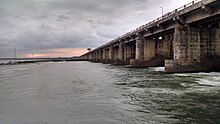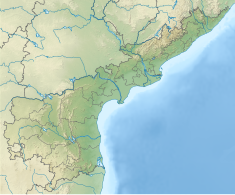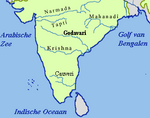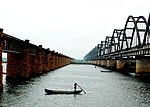Dowleswaram Barrage
| Dowleswaram Barrage | |
|---|---|
 Sir Arthur Cotton Barrage in Rajahmundry | |
| Country | India |
| Location | Dowleswaram, Rajahmundry, Andhra Pradesh |
| Coordinates | 16°55′51″N 81°45′57″E / 16.9307594°N 81.7657988°E |
| Purpose | Irrigation, water supply |
| Status | Operational |
| Construction began | 1970 |
| Opening date | 1982 |
| Owner(s) | Government of Andhra Pradesh |
| Dam and spillways | |
| Type of dam | Barrage |
| Impounds | Godavari River |
| Length | 3,599 m[1] |
| Website irrigationap | |

The Dowleswaram Barrage was an irrigation structure originally built in 1850 on the lower stretch of the Godavari River before it empties into the Bay of Bengal. It was rebuilt in 1970 when it was officially renamed as Sir Arthur Cotton Barrage or Godavari Barrage.[1]
Geography
The Godavari River empties its water into the Bay of Bengal after flowing nearly fifty miles from the Dowleswaram Barrage. Rajahmundry is a city situated on the left bank of Godavari River. Upstream, where the river is divided into two streams; the Gautami to the left and the Vasistha to the right, forms the joining line between the West Godavari and the East Godavari districts. The dam alignment crosses two mid stream islands.
Original Dowleswaram Barrage
The original Dowleswaram Barrage (also spelled Dowlaisweram or Dowlaiswaram) was built by a British irrigation engineer, Sir Arthur Thomas Cotton and completed in 1850.[2] The barrage was constructed in four sections, which allowed flood passage during the construction period. The Dowleswaram Barrage was 15 feet high and 3.5 km long.[citation needed]
Cotton's many projects averted famines and stimulated the economy of southern India. Before this barrage was constructed many hectares of land has been flooded with water and was unused. The water would be worthlessly going into sea. But when Sir Arthur Thomas Cotton had built the barrage those unused lands were brought into cultivation and the water was stored and used. The Cotton Museum was constructed on behalf of Cotton's memory. It is a tourist attraction in Rajahmundry.[citation needed]
Modern Sir Arthur Cotton Barrage / Godavari Barrage
In 1970, the barrage was heightened to 10.6 m. The reservoir has 3.12 Tmcft gross storage capacity and dead storage of 2.02 Tmcft at 40 feet (12 m) MSL.[citation needed]
See also
- List of dams and reservoirs in Andhra Pradesh
- List of dams and reservoirs in India
- Prakasam Barrage
- Godavari Water Disputes Tribunal
References
- ^ a b "Sir Arthur Cotton Barrage / Godavari Barrage B00131". Archived from the original on 26 December 2018. Retrieved 31 March 2016.
- ^ Hope, Elizabeth (1900). General Sir Arthur Cotton, R. E., K. C. S. I.: His Life and Work. London: Hodder and Stoughton. p. 120. ISBN 978-1444629965. Retrieved 26 December 2018.
dowleswaram.
External links





